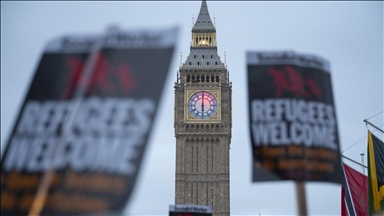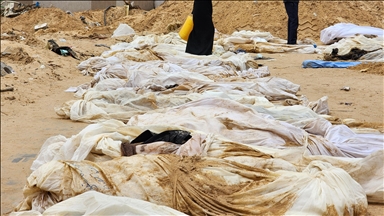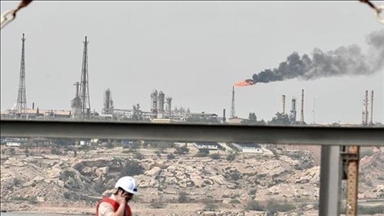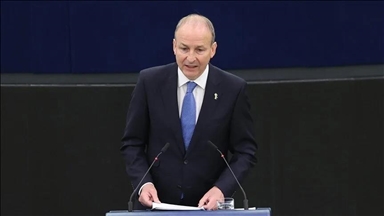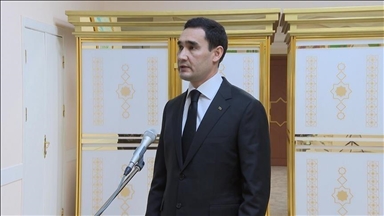Europe unites against ISIL
European countries including UK, France and Germany take several measures to overcome ISIL threat
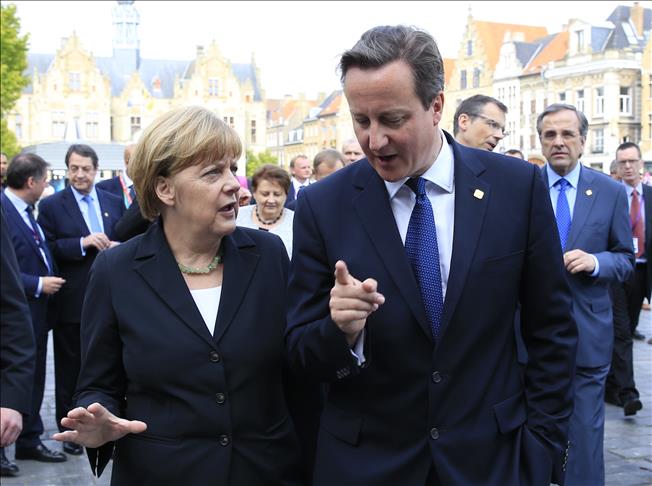
BRUSSELS
European countries have started to take new measures in tackling the Islamic State of Iraq and the Levant, ISIL, against potential terror attacks on European soil.
On September 1, British Prime Minister David Cameron announced the government was looking at introducing new powers to prevent people from traveling to Syria. He said the government would strip British citizenship from dual nationals and refuse re-entry into Britain for those suspected of having taken part in the fighting.
The U.K. is supplying arms to Iraqi Kurds and is conducting aerial surveillance operations but has so far not joined the U.S.-led airstrikes on ISIL, either in Syria or Iraq. A vote in the U.K. parliament which could see Britain increase its military role is expected by the end of the week.
Five hundred U.K. citizens are believed to have traveled to Syria to join the civil war, with 260 believed to have returned to Britain.
UK parliament to be recalled over Iraq action
The U.K. Parliament is to be recalled on Friday to debate whether the U.K. should join United States-led air strikes against ISIL militants in Iraq, Downing Street has announced.
The announcement on Wednesday came a day after the US - along with Bahrain, Qatar, Saudi Arabia, Jordan and the United Arab Emirates - carried out strikes against ISIL targets in Syria.
Government officials said in a statement: "The Speaker has agreed to the Prime Minister’s request to recall Parliament this Friday to debate the UK’s response to the request from the Iraqi government for air strikes to support operations against ISIL in Iraq."
"The Prime Minister has called a meeting of the Cabinet tomorrow," it added.
Government coalition partners the Liberal Democrats have said they are willing to back air strikes in Iraq and Labour have said that they are "open to the possibility".
Nick Clegg, the leader of the Liberal Democrats and deputy prime minister, told the BBC that his party would back air strikes in Iraq as they were "legal" and the UK would be "part of a much bigger coalition ... crucially including a number of Arab countries, which deprives ISIL of the ability to somehow portray it as a west-verses-the-rest crusade".
Military action debate
There is believed to be support among lawmakers for military action in Iraq, but not Syria, and there is doubt whether there would be enough support to secure a vote for military action in Syria.
The U.K. is supplying arms to Iraqi Kurds and conducting aerial surveillance operations, but has so far not joined airstrikes against ISIL, either in Syria or Iraq.
Last year, Cameron lost a vote in parliament to attack the Syrian regime of Bashar al-Assad.
Cameron is currently at the United Nations in New York where he met Iran’s President Hassan Rouhani - the first meeting between a British premier and Iran’s president since Iran's 1979 revolution.
According to a Downing Street official, the pair are scheduled to discuss the ongoing situation in Iraq and Syria and Iran’s potential role in helping to tackle ISIL.
ISIL continues to control large swathes of land in Syria and Iraq and has posted videos apparently showing the execution of hostages, including that of two American journalists and a British aid worker.
'Anti-terrorism' bill of France
The lower house of France's National Assembly accepted an anti-terrorism bill on September 18 which aims to clamp down on French nationals traveling to fight in Syria, Iraq and other regions. For the bill to be passed into law, it now has to go to the French Senate who will rule on it in mid-October.
The law, submitted by French Interior Minister Bernard Cazeneuve in July, aims to deter French nationals from traveling to join groups which have overrun large territories in both countries.
The ban, which is effective for at least six months and is renewable for up to two years, allows authorities to immediately confiscate the passports and identity cards of suspects. The suspects' names can be placed on the Schengen Information System used by European countries and transport companies and they face the possibility of receiving receive up to three years in prison and a €45,000 ($58,000) fine.
The ban can be imposed on French nationals when "there are serious reasons to believe that someone is planning to travel abroad to take part in terrorist activities, war crimes or crimes against humanity or in the threat of the terrorist groups' operations and in conditions likely to jeopardize public security upon their return to French territory," the law reads.
The bill also advocates targeting terrorism on the Internet with the possibility of an administrative blockage of websites that "glorify terrorism."
France determined to fight ISIL: French President
French President Francois Hollande has said that France is determined to fight ISIL and will continue its air-strikes against the militant group in Iraq.
His comments came hours after Algerian Jund al-Khilafa group, which claims to be affiliated with ISIL, issued a video apparently showing the decapitation of French kidnapped national Herve Pierre Gourdel.
Speaking on Wednesday at the 69th annual debate of the United Nations General Assembly, he said his country will "not yield to terrorism" but continue to fight it.
Hollande said: "DAECH (ISIL) is a threat to the entire world ... that's why France has responded to the call of the Iraqi authorities with the supply of arms and air support ... the military operations will continue for the time needed."
Syria 'complicit'
In his speech, Hollande also urged UN member countries to react to the Syrian crisis, pleading: "As long as there is no settlement of the Syrian crisis, all our efforts are likely to be reduced."
Hollande also stressed: "The regime of Bashar al-Assad is just as complicit as ISIL."
French prime minister defends intervention in Iraq
French Prime Minister Manuel Valls has defended his country's intervention in Iraq against ISIL militants, saying the group represents an "international threat".
Speaking in the French Parliament on Wednesday, Valls said France had to take responsibility and intervene as it was a member of NATO, and the national security of France was threatened.
"Helping Iraq is protecting France ... the security of France, Europe and the world is at stake because of the terrorist group DAECH," said Valls, using the Arabic acronym for ISIL.
Valls said that the intervention would be a "long-term" one, saying that France "will carry out further air strikes in the coming days until the Iraqi army regains superiority".
He also ruled out the participation of the Syrian regime in the anti-ISIL coalition led by the U.S.
“Bashar Al-Assad cannot be a partner in fighting ISIL,” he said.
'Violent message'
Seeking to send a reassuring message to France's Muslims, Valls said the ISIL group did not represent Islam, adding: "France makes a clear distinction between Islam - the second religion of France; an asset to our country - and Islamism as a terrorist act."
"Jihadism is just a violent message that contradicts the universal values of Islam."
Regarding a threat by Algerian kidnappers to kill 55-year-old French hostage Herve Gourdel, Valls reiterated that Paris would not negotiate with the hostage-takers.
The Jund al-Khilafah, a group in Algeria, claimed on Monday that it was affiliated with ISIL and threatened to execute Gourdel within 24 hours if French President Francois Hollande failed to stop military operations in Iraq against ISIL.
ISIL has captured large swathes of land in Iraq and Syria, declaring a cross-border Islamic "caliphate".
Germany bans supporting ISIL
German Interior Minister Thomas de Maiziere on September 12 said participation in propaganda, financial and material support for ISIL was prohibited “with immediate effect.”
The ‘operational’ ban includes the wearing of badges or the use of ISIL symbols in social media or at demonstrations including the holding of meetings; and it also allows for the confiscation of property.
“We need to prevent radicalized people carrying the war to our cities. In Germany there is no place for a terrorist organization such as ISIL, which opposes the free democratic order in our country,” he added.
The German government decided in August to supply military goods, arms and ammunition to Iraqi Kurds but ruled out sending troops to the region to fight against ISIL.
ISIL has captured large swathes of land in Iraq and Syria, declaring what it calls a cross-border Islamic "caliphate," killing thousands and displacing millions in the two countries. It has posted graphic online videos of mass executions, as well as the beheadings of Western hostages.
The militant group has driven an estimated 1.2 million Iraqis from their homes in a conflict that is engulfing the area. In order to help peshmerga and Iraqi forces to fight against ISIL militants, the U.S. has conducted dozens of airstrikes since August 7.
Anadolu Agency website contains only a portion of the news stories offered to subscribers in the AA News Broadcasting System (HAS), and in summarized form. Please contact us for subscription options.


